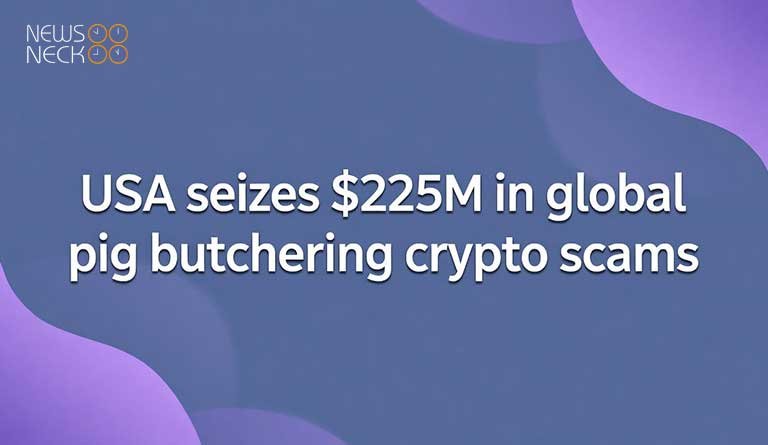The $225 Million Takedown: How U.S. Forces Sliced Into a Global ‘Pig Butchering’ Scheme
In the world of online fraud, there is a special kind of cruelty. It does not rely on a quick hack or a simple theft. Instead, it feeds on one of the most human of needs: the desire for connection. Scammers build relationships over weeks or months, earning trust with friendly or romantic messages, before convincing their targets to invest in what seems like a fantastic financial opportunity. The criminals call this “pig butchering.” They see their victims as livestock to be “fattened up” with false promises before they are financially “slaughtered”.
This week, the U.S. Department of Justice (DOJ) struck a major blow against these predatory schemes. Federal prosecutors announced the largest-ever seizure of cryptocurrency tied to “pig butchering” scams, targeting more than $225 million in digital assets. The action reveals the vast, organized, and heartbreaking nature of a fraud that has cost American victims billions of dollars.
“The Pig That Was Butchered”: A Victim’s Story
To understand the real-world impact of these crimes, one needs to look no further than the case of Shan Hanes. He was not a naive investor; he was the CEO of Heartland Tri-State Bank in Kansas. Yet, he became ensnared in a pig butchering scam, which led him to embezzle $47 million from his own bank in a desperate attempt to secure what he thought were his invested funds.
His story ended in personal and professional ruin. In 2024, Hanes was sentenced to 24 years in prison. As his own lawyer wrote, “He was the pig that was butchered”. His case is a stark reminder that these scams can devastate anyone, from average citizens to seasoned banking executives.
The Investigation: Tracing Digital Clues
The road to the $225 million seizure began with a tip from the private sector. In 2023, the stablecoin issuer Tether and the crypto exchange OKX alerted law enforcement to a series of accounts they believed were helping to launder fraudulently obtained currency. This cooperation was crucial, showing how tech companies are increasingly working with authorities to combat crime on their platforms.
From there, federal agents from the FBI and the U.S. Secret Service took over. Using blockchain analysis and other investigative tools, they untangled a “sophisticated blockchain-based money laundering network” designed to conceal the source of the stolen funds. The criminals had used hundreds of thousands of transactions to obscure the money trail, but investigators patiently followed the digital breadcrumbs.
You Might Like it: Trump’s Tariff Threat Sparks Market Turmoil Again:
The Human Cost Behind the Scam
The DOJ has identified over 400 suspected victims worldwide, including dozens of U.S. residents. But the victims are not only those who lost money. The complaints filed by prosecutors allege that the funds were linked to a “scam compound” in the Philippines. These locations often house workers who are themselves victims.
According to the United Nations, many people in these compounds are forced to work against their will by transnational criminal rings. They are often trafficked to Southeast Asian countries and compelled to run the scams, meaning the “butchers” are often also being slaughtered in a different way.
The scale of this fraud is astronomical. The FBI reported that losses from cryptocurrency scams in the U.S. skyrocketed to $9.3 billion in 2023-2024, a 66% increase from the previous year. Another report noted that pig butchering scams alone accounted for more than half of all crypto scam losses in 2024.
The Bottom Line
The seizure of $225 million is a landmark moment, but it is just one battle in a much larger war. The DOJ has made it clear that it plans to return the seized funds to the victims where possible. As Matthew Galeotti, head of the DOJ’s criminal division, stated, “These schemes harm American victims, costing them billions of dollars every year… and we will relentlessly pursue recovery of victim funds”.
For the public, the lesson is twofold. First, be deeply skeptical of investment opportunities that come from unsolicited contacts online, especially those that blossom into friendships or romances. Second, this case demonstrates that law enforcement is developing the tools and partnerships to track and recover digital assets, sending a clear warning to criminals who operate in the shadows of the blockchain.
The “pigs” are fighting back.
Author: Yasir Khan
Date: 14 Oct, 2025
For More Updates, Visit Newsneck













